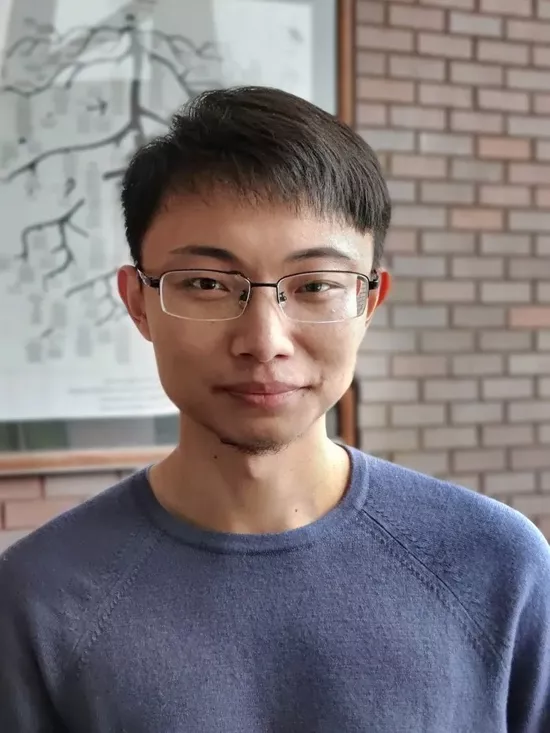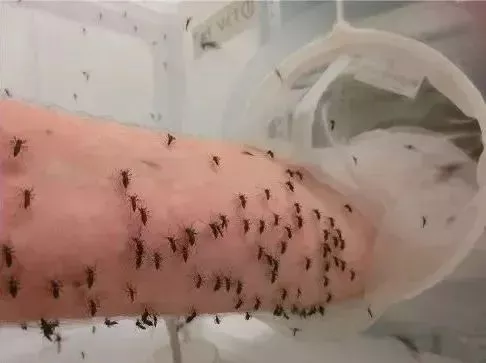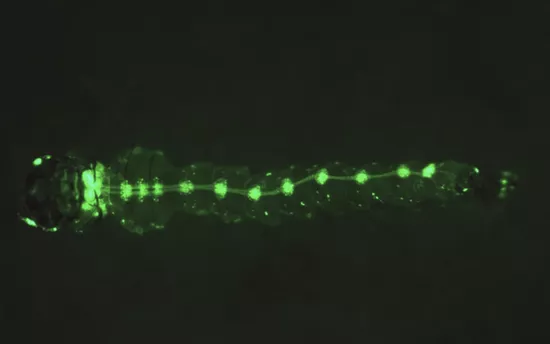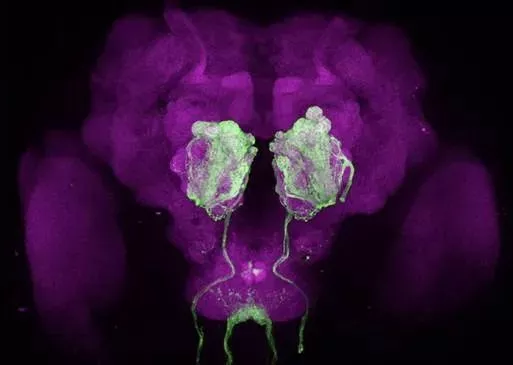From the age of 23 to 29, zhaozhilei was obsessed with the study of biting mosquitoes "... I've been thinking about the problem I'm studying and trying my best to make new progress. I dream about the topic I'm studying more than once." In an exclusive interview with China Science Daily, the doctor from Princeton University admitted that he liked the unique research: starting from a creature with a certain magical ability, and then revealing a more universal law.
By zhaoguangli, reporter of China Science Daily
Mosquitoes are one of them. "They have a very sharp sense of smell.". Finally, in May 2022, 30-year-old zhaozhilei, as the first author and corresponding author, published a paper in the journal Nature, explaining the brain activities of mosquitoes when looking for their host (human). This research has scientifically answered the question "why do mosquitoes bite me?" which has caused many people to scratch their heads.
Now, zhaozhilei has gone to Cornell University to carry out postdoctoral research in neurobiology. His post doctoral research is no longer about mosquitoes, but about parrots. This is a bit risky, but he is firm in his heart: "if I continue to study mosquitoes, I can find a teaching position faster. But what I value more is that I am very interested in parrots. New technical means mean that we can now study their brains in depth. Some important scientific problems may be solved by studying parrots."


"We must seize this opportunity"
Zhaozhilei's curiosity about mosquitoes germinated in his childhood.
In his hometown, Yunnan, there are many mosquitoes. Every night in the summer, he would wake up with a bag, except his father. "The whole family watched TV together. Mosquitoes even bypassed him to bite us."
Zhaozhilei was puzzled. Naughty, he even caught mosquitoes and put them on his father's arm, but the mosquitoes were afraid to escape.
Mosquitoes suck blood and pick people? If there are "selection criteria" for biting, what is the criteria? This question left a big question mark in zhaozhilei's heart.
The pointer of time comes to 2015. After graduating from Peking University, zhaozhilei wanted to apply for a doctorate in the United States.
In the selection, he found that a laboratory at Princeton University specializes in the study of a tropical and subtropical mosquito, Aedes aegypti. This small mosquito, which originated in Africa, has miraculously flown to all parts of the world in less than 10000 years. Moreover, they have become more and more like biting, just like "biting professionals".
During the interview, Lindy McBride, an assistant professor in the laboratory, showed him an experiment: a hundred hungry mosquitoes were asked to choose whether to bite people or animals. As a result, almost all mosquitoes quickly chose the human side.
She told zhaozhilei that although everyone had known this phenomenon for a long time, it has been an unsolved mystery what mechanism mosquitoes rely on to distinguish humans from animals.
Zhaozhilei was very excited about the operation like a mosquito puzzle, so he decided to join the laboratory on the spot to solve the puzzle!
With the deepening of his understanding of mosquitoes, zhaozhilei, in addition to his curiosity, "gradually has a sense of mission.".
Mosquitoes are not only annoying, but also very dangerous - they can efficiently spread deadly viruses from person to person. When reading the literature, zhaozhilei saw a set of figures: according to who statistics, about 720000 people die of mosquito borne diseases such as malaria and dengue fever every year.
This is an astronomical number! He thought to himself, "if I can figure out how these mosquitoes accurately distinguish human beings from animals, it is possible to develop efficient mosquito catching and repelling methods to reduce the harm caused by mosquitoes."
In fact, this problem has been studied for decades, and there has been no good breakthrough. The reason is that scientists can only use limited technology on mosquitoes.
However, it is different now.
Zhaozhilei thought he was very lucky: "at the time when I joined the mosquito research, a number of powerful technologies appeared, such as gene editing technology and calcium imaging technology. At that time, we realized that applying these latest technologies to the mosquito research could make a breakthrough."
This is a golden age for studying mosquitoes. Zhaozhilei is lucky enough and "desperate" enough. He must seize this opportunity.

Feeding blood to keep mosquitoes? Here, arm!
Keeping mosquitoes is the first step.
It's OK to collect mosquito eggs in the field and bring them back to the laboratory for incubation, but how to raise them? Or how to feed them blood?
Aedes aegypti does not like animal blood, so the method of "wrapping rabbit blood with thin plastic film" commonly used in the laboratory is not very effective; The simplest and most efficient way is to put your arms directly into the mosquito cage.
Is it dangerous? Zhaozhilei explained to China Science Daily that this method of feeding mosquitoes was demonstrated and approved by the Ethics Committee on the basis of understanding mosquito biology; At the same time, of course, it is completely voluntary.
And don't worry, this method won't spread the disease.
He explained that mosquitoes are only the vector of pathogen transmission, not the source of its generation, so they will not spread across generations. Therefore, mosquitoes hatched from eggs in the laboratory are very "clean" and do not carry pathogens. At the same time, the laboratory clearly stipulates that the same batch of mosquitoes can only be "fed" by the same person, so it will not cause the situation of human to human transmission.
In Lindy McBride's lab, a "cruel" colleague set a record of feeding 3000 mosquitoes a day.
Zhaozhilei, who is slightly thin, has a record of 1500. The first time he fed mosquitoes, his arm became swollen and itched for a long time. Later, Lindy McBride asked him to rinse with hot water (which can accelerate the blood circulation of the skin), and then the swelling slowly disappeared.

Zhaozhilei's tutor is feeding mosquitoes
A few months later, zhaozhilei could not feel the itch when he fed mosquitoes by hand. He said that this was because "the immune system has adapted".
After raising mosquitoes, you can collect "human taste" and various animal smells, find out the differences in smells, and then verify what smells they are interested in through mosquitoes.
Zhaozhilei told China Science Daily that the way they collect "human flavor" is also unique: the whole person needs to be stripped off and lie in a clean plastic bag, and then fill the plastic bag with clean air, so that the discharged air has "human flavor". However, the process is a little long. People have to lie in plastic bags for two hours.
Through comparison, the research team found that compared with animals, there is no unique chemical molecule in human odor, but there are several molecules, such as decanal and methyl heptane ketone.
These two molecules are the products of oxidation and decomposition of some oily substances secreted by human sebaceous glands after contacting with air. These oily substances are hardly secreted by animal sebum, which also explains why "human taste" is so special.
The next step is to find out why mosquitoes like "human taste" so much?

"Failure is also an important part of evaluating contributions"
In order to explore this problem, their experimental plan was groundbreaking: perform "craniotomy" on the mosquito to see what was "thinking" in its brain.
If we can know which part of the brain area of mosquitoes is activated when they smell "human flavor", they can further investigate whether the mosquito brain has a special preference for certain molecules (such as decanal or methylheptanone)?
By solving this problem, we can not only decipher the criteria for selecting mosquitoes at one fell swoop, but also be very useful - compared with the "human flavor" composed of hundreds of molecules, specific chemical molecules are easier to be manufactured and stored, which will make it easier to make new mosquito traps.
The answer is indeed within the scope of this hypothesis: their subsequent research found that mosquitoes like people with moderate decanal content in their body odor.
Zhaozhilei explained that one potential reason is that few or many people have decanal in the population. If mosquitoes tend to like such people, their probability of finding suitable people will be reduced, which is not conducive to their reproduction.
But in the research, the "craniotomy" of mosquitoes is not so easy to do - they have to let mosquitoes survive after craniotomy.
Gene editing technology makes this bold experiment feasible.
By editing mosquito genes, nerve cells in the mosquito brain are specifically labeled to express fluorescent proteins. In this way, when the nerve cells in a certain brain region of the mosquito are activated, the fluorescence will increase, so that we can know which brain region is activated.
However, the success rate of gene editing mosquitoes is too low, even less than 0.1%.
Zhaozhilei did gene editing for the first time. He worked hard for nearly 6 months before screening several fluorescent larvae. At that time, he was very excited and thought that he would succeed soon, but after a few days, these fluorescent larvae were "wiped out".

"I was in a bad mood at that time. But after careful analysis, the negative results also laid the foundation for our subsequent success." Zhaozhilei said that a good experimental design, whether the results meet the initial expectations or not, provides very useful information, which can be used to constantly revise and improve our understanding of nature. "This is also an important part of evaluating our contribution to this field.".
In this way, it took the research team five years to produce transgenic mosquitoes for experiment.
Through experiments, they found that although there are nearly 100 kinds of chemical molecules in human smell, only two regions of the mosquito's primary olfactory brain are activated.
They matched a mixture of only two chemical molecules to activate the two brain regions and found that it was very attractive to mosquitoes, just like the smell of real people.

"We have applied for a patent and hope to apply this mixture to mosquito traps to attract and kill mosquitoes." Zhaozhilei disclosed that at present, several companies developing mosquito control products are negotiating with them on patent transfer and cooperation.
In addition, zhaozhilei said that his colleagues are also exploring another idea: if a compound can be screened and it can specifically inhibit the two brain regions activated by "human taste", then this compound may be used as a mosquito repellent - it will interfere with mosquitoes' sniffing of people.

An adventurous choice
After graduating from Princeton University and turning to the study of parrots, zhaozhilei made an adventurous choice.
Before that, zhaozhilei had an "open and close" life. The No. 1 student in Science in Dali Prefecture, Yunnan Province, was admitted to Peking University to study bioengineering; After graduating from Peking University, he went to Princeton University to study mosquitoes; He now studies neurobiology at Cornell University.
He has his reasons. Zhaozhilei told reporters that, like mosquitoes, parrots also have a magical ability: in the wild, they can quickly imitate the cries of their neighbors, and when they are kept as pets, they can imitate human speech.
"They have very interesting social behaviors and cognitive abilities. This powerful learning and imitation ability is rare in nature." Zhaozhilei said that there is a school of thought in the academic circles that the reason why human beings are so successful in evolution is that they can also learn and imitate quickly. Therefore, he felt that to study the brain mechanism of learning imitation, "parrot is a very good model".
Zhaozhilei revealed that his current research focuses on the role of dopamine in the brain in this process.
The road ahead is full of unknowns and even great challenges, but zhaozhilei claims to be "firm in heart".
He told reporters that he has a wide range of interests and likes to read the history of science and biographies. "These ordinary accumulations may be very useful in making choices. Because he has a general picture of discipline development in his mind, he can have his own understanding of what are the more important issues and what breakthroughs NEW technical means can bring."
He also attributed his past achievements to his own luck: "I think it should be choice, hard work and some luck. Personally, I was lucky to be born in a family that attaches importance to education. Along the way, I have been supported and helped by many teachers and friends. In a big way, I am very lucky to live in an era that advocates the rapid development of science and technology."
The college entrance examination is coming soon. Zhaozhilei, as a "passer-by", sent a message to the younger students who will take part in the college entrance examination:
"Twelve years ago, I took part in the college entrance examination, which changed my destiny. What I want to say is that you can do the same! However, I also want to tell you that the college entrance examination is an opportunity to change your destiny, but it is definitely not the only opportunity. Once cultivated, people can use it for life."
Relevant paper information:
https://doi.org/10.1038/s41586-022-04675-4
Source: China Science Network